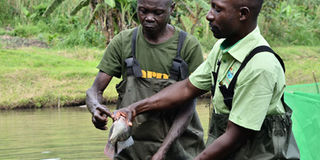Farm camp gives learners glimpse of the future

David Mununuzi, an aquaculture technician at Rwebitaba ZARDI, shows farmers how to identify the sex of fish.
What you need to know:
- As part of expanding the impact of their agriculture education, they distribute heifers to other schools. The parent stock was donated by the National Animal Genetic Resources Centre and Data Bank (NAGRC).
Uganda produces food with a potential to feed more than 200 million people according to estimates by the World Bank.
In 2020, agriculture contributed around 24.3 percent to the GDP while raking in 34 percent of export earnings. Although latest innovations combine technology in machinery, genetics and processes, it will always require hands in the soil.
That means competent passionate people who will take care of the land itself.
Growing numbers of young people under 25 years of age, who constitute 77 percent, are looking towards white collar jobs. But the responsibility of teaching these future farmers is taken on by educators such as Gayaza High School which since 2014 has been organising what they call the School Farm Camp. Supported by the National Agricultural Research Organisation (Naro), Engineering Solutions, Victoria Seeds, Uganda Revenue Authority (URA), Help Project and Uganda Biosciences Information Centre (UBIC), is a nerve centre of knowledge, resources and expertise, which has helped schools prosper with their school farms.
Gayaza runs a farm camp during the school’s third term where students can experience life in farming. Trainers broaden the children’s minds by showing opportunities in the primary sector including simple ideas such as kitchen gardens. But this year, the week-long event was hosted virtually.
Impactful
Head teacher Robinah Katongole Kizito, said this year’s theme on agripreneurship is in accordance with the new curriculum.
“We are preparing the children for the future. Persons who have skills to enable them thrive whenever they can be in the world,” she said during the launch of the activities on Monday at the school campus. She says the farm camp has been a massive success noting that in 2019, they welcomed more than 1,000 participants at the school. She expected more than 5,000 participants using the virtual space.
“As a result, even our school farm has grown. The enterprises are bigger and better. At the school farm we had 46 cows but now we have 70 milking cows,” she notes.
As part of expanding the impact of their agriculture education, they distribute heifers to other schools.
The parent stock was donated by the National Animal Genetic Resources Centre and Data Bank (NAGRC).
Eight beneficiaries including; Iganga Girls, Tororo Girls, Mary Hill High School Mbarara, Ndejje SS, St Mary’s College Kisubi, Nyakasura School and Muyenga High School, have been given heifers as participants in annual agribusiness school competitions.
First choice
Victoria Ssekitooleko a school alumni and successful farmer says the practical basics from the farm camp help learners to understand the inner workings of the farming lifestyle.
“It is important to know where food comes from. Whatever else happens, people still need to keep eating. If it weren’t for farmers there would be no food in the market. That is a huge responsibility every young person should be a part of.’’ Ssekitoleko urges all Ugandans to have an appreciation of agribusiness.
“Schools should prepare the youth for the tasks in agriculture tomorrow to allow them to make choices in the future. We should first of all prepare them for consistent production. Agriculture should be a sector of choice. Many people do not like agriculture because they have something else to do. Agriculture being the largest employer, why should we leave it to only school dropouts. When you train children in agriculture, we can increase exports and make farming sustainable,” she adds.
Key facts
Gayaza runs a Farm Camp during the school’s third term where students can experience life in farming.
Trainers broaden the children’s minds by showing opportunities in the primary sector including simple ideas like kitchen gardens. But this year, the week-long event has been hosted virtually




